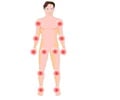Recent study has increased the number of genes linked to juvenile idiopathic arthritis (JIA) from three to seventeen.

"These findings will help us understand how the long suspected genetic contributions to JIA are driving the disease process, with the ultimate goal being earlier and improved diagnosis and treatment," Thompson said.
JIA is the most common rheumatic disease of childhood that involves several different but related forms. Affecting some 50,000 children in the US, the actual cause of the disease remains unknown. JIA is considered an autoimmune disorder, in which the body's immune system mounts an attack against its own healthy tissues. JIA can be treated with medications and physical therapy, but the disease can persist for many patients into adulthood.
Prior to the current study only three genes were associated with known JIA risk, although scientists have suspected the likelihood that more genes are involved. The research team used what is known as the Immunochip array to measure variation in the genes (DNA) coding for components of the immune system for 2,816 JIA patients in the study. Those findings were compared to the DNA of 13,000 healthy controls to look for genetic differences.
The analyses re-confirmed JIA's connection to the original three genes, identified a link to the 14 new genes and pointed to the possibility that another 11 genetic regions may be implicated. The scientists stressed that their work continues in order to identify additional genetic links and also begin conducting functional studies to pinpoint disease processes.
Although the current study substantially increases the number of confirmed susceptibility genes for JIA, the researchers said their data indicate that additional genetic risk factors still remain to be discovered.
Advertisement














